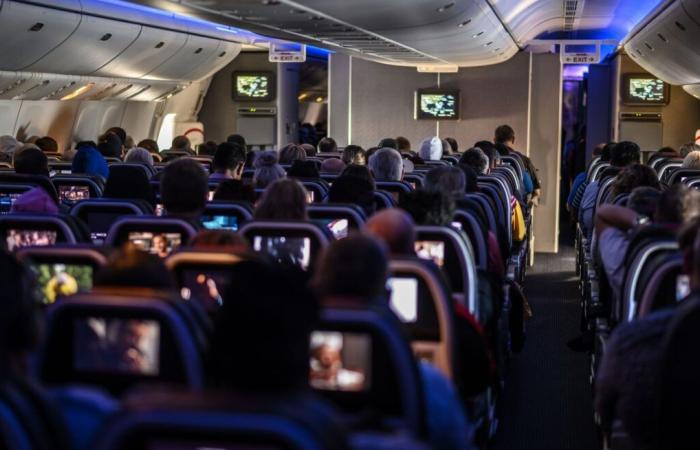They go unnoticed, or almost. However, they are essential players in the cultural sector. Duty offers a series of portraits of shadow professions through the confidences of professionals who practice them. Today: those responsible for programming airline entertainment systems.
The largest movie theater in the country is in the air. In its fleet of some 200 planes, Air Canada offers more than 1,000 films and 3,500 episodes of TV series thanks to its in-flight entertainment system. Air Transat and WestJet also offer hundreds of films. But who selects them, and according to what criteria?
Let us first admit that it may seem strange to focus on these shadow workers in the context of a series devoted to cultural professions. But when you think about it, those responsible for programming airline entertainment systems play a key role in the cultural community, particularly with independent distributors.
In 2023, Air Canada alone transported more than 46 million passengers. It is therefore not surprising that the rights to films presented on board are often negotiated for thousands of dollars for a few months of broadcasting – agreements that Quebec distributors, often in a precarious financial situation, necessarily dream of.
Strategic partnerships
At the national airline, it is Kayleigh Hennessey, head of content and partnerships, who has the last word. Her selection process involves “agreements with the major Hollywood studios, with independent producers and studios as well as with streaming platforms,” she says. The maple leaf company has partnered with Apple TV+, Disney+ and Crave.
For its part, WestJet indicated to Duty collaborate with the Toronto indigenous film festival ImagineNATIVE, among others, “to showcase quality Canadian content”. This type of partnership with festivals is common practice in the industry. Air France, for example, offers 1,500 hours of cinema; the French carrier is a partner of the Cannes Film Festival and displays on certain flights a special selection of films from previous editions of the event.
Anne Bourbeillon is head of in-flight products at Air Transat. In addition to selecting films for the Quebec company, she can sometimes collaborate with her marketing team to “offer an immersive experience,” she explains. Thus, last May, during a flight between Montreal and Brussels, Air Transat, as part of a partnership with Chocolats Favorites, distributed treats to passengers to mark the arrival of the film Wonka (2023) in its planes.
This is why Mme Bourbeillon says he wants to find the films “best suited to Air Transat’s brand image, while aligning this programming with the company’s overall customer experience strategy.” For Air Transat — an “airline [de] leisure,” she explains — this translates into “a diverse mix of films and series that will appeal to vacationers, such as comedies, dramas and action-adventure films.” In other words, more popular cinema.
Quebec content
It goes without saying that films about plane crashes or films about terrorism and radicalization are excluded. The big studios sometimes even offer watered-down versions of their art films designed especially for airlines. In 2016, Delta Air Lines passengers notably denounced that most of the sex scenes in Carol (Todd Haynes, 2015), a lesbian love story, have been edited or deleted.
Air Transat offers 345 hours of in-flight entertainment, a number that may seem meager compared to Air France’s 1,500 hours. The Quebec company nevertheless presents 30% of content from here, probably the highest proportion in the world.
Air Canada also intends to “take into account regional and demographic demand in the development of its strategy,” underlines Mr.me Hennessey. She adds, however, that “the emphasis is on the quality of entertainment rather than on meeting quotas.”
In April 2023, Duty reported that very little Quebec TV content was shown on the Canadian carrier’s planes (unlike local films, such as Mr. Lazhar (2011), Mommy (2014) et 1995 (2024), which are more numerous). “In recent months, we have, among other things, added Quebec series, such as The eye of the storm saison 3, Discussions with my parents season 6 and To candidates season 1,” says Mme Hennessey.
Algorithmisation
To make their choices, airlines cannot turn their backs on the algorithmization that is taking place throughout the cultural industry. They carefully monitor passengers’ favorite films and the best times of year for their presentation.
In an article in the French cultural weekly Telerama published in 2019, an Air France spokesperson explained that the company even hoped one day to set up systems that would allow passengers to log in during each of their flights with the aim of being offered corresponding films to their preferences.
For the moment, Air Canada, Air Transat and WestJet say they rely on surveys conducted with their customers and employees as well as on the data they collect from entertainment systems. “Thanks to this attentive listening, we have seen a continuous improvement in the satisfaction rate regarding our entertainment offering, year after year,” concludes Anne Bourbeillon.






